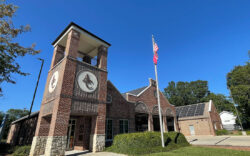Most Americans would agree that slavery and racial segregation was a great injustice. More controversial is whether this country should do anything to make amends for the harm that Black Americans have suffered and continue feeling the effects from today.
The Athens-Clarke County Democratic Committee took up the weighty question of reparations in a panel discussion at its June 22 meeting. Panelist Nyheim Way, president of United Sons and Daughters of Freedmen, spoke about the nationwide reparations movement and advocated for a $14 trillion direct cash payout over 10 years. As recommended by economist Sandy Darity, Way called for descendants of slaves to receive about $400,000 per person in total.
That may seem like a lot of money, but Way didn’t stop there. He also advocated benefits like free college and immunity from sales taxes for the descendants of slaves. Way said that this kind of intervention is necessary to equalize the racial wealth gap, which remains massive even today, over 150 years after slavery ended.
“How it looks, ultimately, is us being on par with America,” Way said. “[America] shouldn’t leave its day-one citizens behind, meaning its freedmen population.”
While $14 trillion is justifiable given the immense amount of wealth white Americans stole from Black people over the centuries, Way’s proposal is extremely controversial even among Democrats. A recent Pew Research poll found that only 30% of Americans support reparations of any kind; fewer still are likely to support a number as high as $14 trillion. Democrats are evenly split on the question even though support is extremely high among Black voters, a core component of the Democratic coalition. Only a very small number of Republicans polled supported the idea.
Even if Congress won’t reach an agreement on reparations anytime soon, it’s still possible to advance the idea on the local level. Panelists Hattie Thomas Whitehead, chair of the Athens Justice and Memory Project, and Chaplain Cole Knapper, vice president of Athens Reparations Action, described what they’re already doing to help Athens lead the way on reparations and become a model for other communities.
Whitehead grew up in Linnentown, a Black neighborhood that was razed by the city of Athens and the University of Georgia during the “urban renewal” period of the 1960s. In 2021, Whitehead and other Linnentown descendants successfully pushed the ACC Mayor and Commission to pass the Linnentown Resolution, which explicitly calls for reparations for that neighborhood’s destruction. “We were grateful for that,” Whitehead said. “That’s the first time we’ve heard of a resolution [for reparations] being passed unanimously anywhere in this country.”
Jerry Shannon, a UGA geographer and economist, estimated in a recent study that Linnentown descendants are owed $5 million in reparations for the loss of their land, for which they were underpaid. While the Georgia Constitution prohibits direct monetary payouts to individuals, the Athens Justice and Memory Project has made recommendations to the local government for how to spend this money, legally, in a way that will benefit Athens’ Black community. At the direction of Whitehead’s group, the ACC government will support home ownership by offering grants and home repair assistance in certain census tracts to benefit Black Athenians. The local government will repay the rest of their debt through the creation of a new Black history center.
That’s a big step forward for reparations in Athens, but Oconee United Methodist Church and Ebenezer Baptist Church West have decided to go further and start raising money themselves for local reparations that will go directly to the individuals affected. That’s why they formed the nonprofit Athens Reparations Action, according to Knapper. Knapper’s organization will donate 100% of the money they raise over the next year directly to Linnentown descendants. Beyond 2024, they’ll raise money for descendants of other Athens neighborhoods destroyed by urban renewal, such as The Bottom and Lickskillet.
“There’s a narrative that you can’t talk about reparations. That we’ll never get to reparations,” Knapper said. “That’s something I think we have to overcome, but I believe we will. If we teach people about this country’s history, I think that knowledge will create a situation where people will say yes. The moral narrative shifts and changes when we educate ourselves about these injustices and how they resonate today. It absolutely will happen here.”
Mokah Jasmine Johnson, vice chair of the ACCDC’s Affirmative Action and Diversity, Equity and Inclusion Committee, facilitated the panel discussion. She is asking for local Democrats to continue discussing reparations and eventually to endorse the idea of racial reconciliation in the local party’s platform. Johnson said that this would include an apology for the harm the Democratic Party has caused Black Athenians in the past, support for the idea of reparations and a commitment to a more diverse and inclusive party.
Like what you just read? Support Flagpole by making a donation today. Every dollar you give helps fund our ongoing mission to provide Athens with quality, independent journalism.










